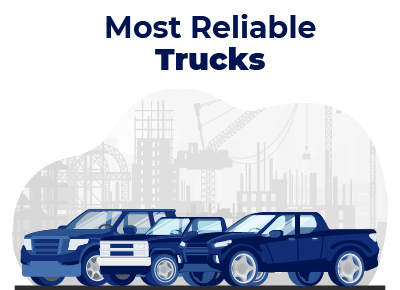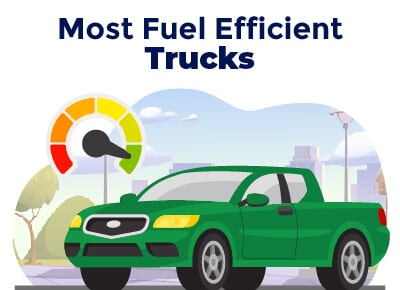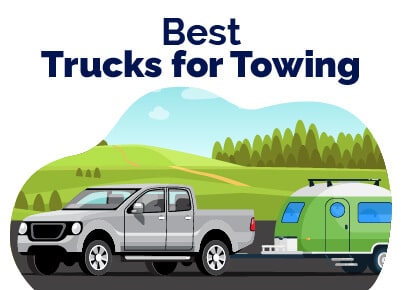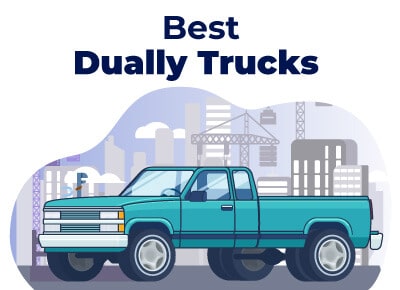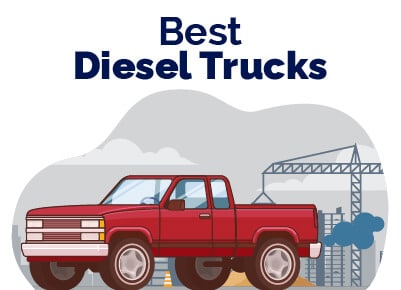Dually Trucks Explained: What They Do Best
January 31, 2024
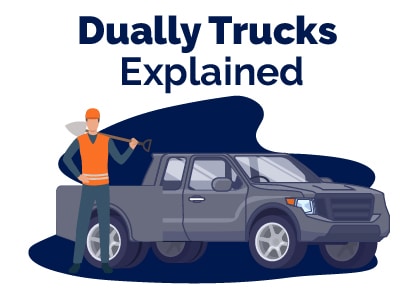

I am a serial entrepreneur and a consumer advocate. When I’m not helping car buyers, I love working on ventures that have a positive impact.
I run a cause marketing agency and serve on the board of Vayu Global Health where we are disrupting the medical industry and preventing the needless deaths of mothers and babies during childbirth.
Understanding the unique demands of heavy hauling and towing, we know the choice between a dually and a non-dually truck isn't just about size – it's about capability and confidence on the road. That's why we're delving into dually trucks.
These powerhouses stand as the unsung heroes for demanding tasks that non-duallies just can’t handle.
If you're weighing the benefits of enhanced towing capacity and superior road grip, keep reading. Our expert editors have compiled their resources to help you determine if a dually truck could be your ultimate workhorse.
Table of Contents
What Is a Dually Truck?
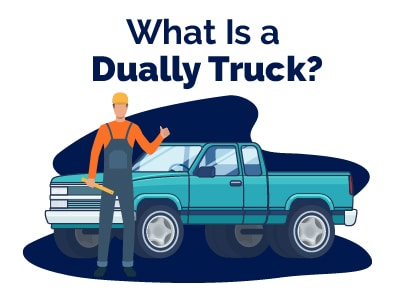 A dually truck is a truck that has more than two wheels on its rear axle. A dually truck or dual-rear-wheel truck (DRW) is easy to identify with the presence of four wheels on the back axle along with its large fender flare.
A dually truck is a truck that has more than two wheels on its rear axle. A dually truck or dual-rear-wheel truck (DRW) is easy to identify with the presence of four wheels on the back axle along with its large fender flare.
What Size Truck Is a Dually Truck?
The specific size of a dually truck will vary by the manufacturer and the model. However, you'll generally find the dual-rear-wheel option on heavy-duty size truck models.
As an example, the 2021 Dodge Ram 3500 heavy-duty dually truck has an overall length of 249.9 inches with a height of 78.5 inches and a width of 79.5 inches.
How Much Does a Dually Truck Cost?
The exact pricing of a dually truck will depend on a number of factors, including the make, model, and trim level of the truck.
For example, the starting price of a Chevy Silverado 3500HD dually truck starts at $35,995. However, the price of a dually truck can be optioned out to as high as $100,000.
Dually vs. Non-Dually Quick Comparison
We know that it’s sometimes hard to have a frame of reference for duallys and how they’re different from regular, non-dually trucks. So, we’ve compiled a quick guide to help you understand the differences and similarities between duallies and non-duallies.
| Towing Capacity | ||
| Stability | ||
| Maneuverability | ||
| Maintenance Costs | ||
| Fuel Efficiency | ||
| Purchase Price | ||
| Resale Value | ||
| Suitability for Off-Roading | ||
| Parking | ||
| Payload Capacity |
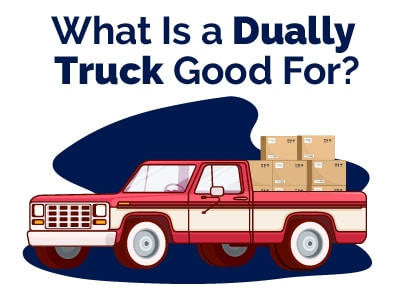
What Is a Dually Truck Good For?
The main reason why someone would want a dually truck is to have higher towing and payload capacity.
For instance, if you are towing a large trailer, then the extra wheels on the rear axle on the dual rear wheel truck will provide better control.
Also, if you plan on hauling heavy items in the bed, the rear wheels of the dually truck will provide better support and stability while driving on the road.
For even more hauling power, consider a dump truck.
Dually Truck Pros
There are lots of good reasons to consider a dual-rear-wheel truck (DRW) or dually as your next vehicle. Here’s a look at dually truck pros:
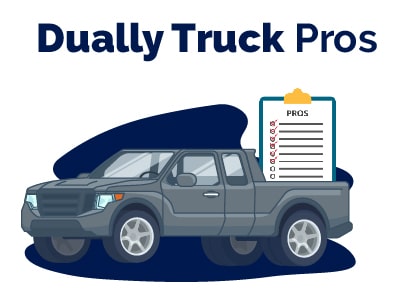
Get Better Towing and Hauling Capability
If you are looking to haul or tow more with your truck, then a dually truck will give you a better level of capability. A dually truck can be an especially good choice if you are using your truck at a worksite.
More Stability in Windy Situations
If you are driving a large trailer in windy conditions, then a dually truck will provide you with better control, thanks to the extra two wheels on the rear axle.
Better Resale Value
Because of the extra utility that a dually truck offers, you are likely to get a better resale value from the truck.
Dually Truck Cons
Along with the pros, there are some downsides that come with owning a dually truck. Here are some of the cons of a dual-rear-wheel truck (DRW) that you should consider:
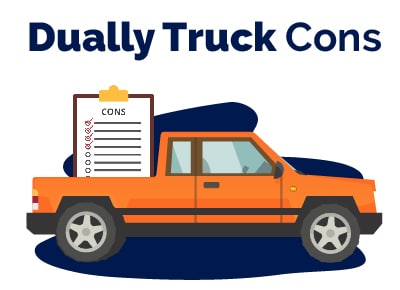 Large Width Makes It Harder to Maneuver
Large Width Makes It Harder to Maneuver
Because a dually truck is wider in the back, you can expect to have some issues when parallel parking the vehicle. Also, maneuvering the dually around tight corners can be challenging.
You Will Have to Buy and Maintain the Extra Tires
Instead of maintaining four tires on your vehicle, you will have to factor in the cost and the maintenance of six tires on your truck.
Can Be Harder to Maintain
Because a dually truck has inside rear wheels, it can be harder to maintain when you need to rotate or service the truck’s wheels. Also, repairing a flat on the interior rear wheels will be more difficult.
Dually Truck Models
Just about every truck manufacturer offers dually trucks. Here’s a look at some of the top dually trucks available:
- Chevy Silverado 3500HD
- GMC Sierra 3500HD
- Ford F-350 Super Duty
- RAM 3500
Are Dually Trucks Worth It?
Dually trucks are worth it if you plan on doing some heavy-duty towing and hauling with your truck.
Also, if you intend to tow a larger trailer through windy conditions, the extra stability and control that the four rear tires offers will certainly make the dually truck worth the price.
Conclusion
When you need a workhorse to take care of the heavy lifting, dually trucks have the engine strength, stability, and towing power to get the job done.
For the latest insights on vehicles like these, join the FTBCP newsletter. Stay ahead in your car buying journey.
Frequently Asked Questions
Why is it called a dually truck?
A dually truck gets its name from its dual rear wheels. This gives the truck its unique look along with its higher level of hauling and towing capability.
Are dually trucks hard to drive?
Dually trucks will be harder to park and maneuver due to the larger rear width of the vehicle. However, a dually will be easier to drive in windy conditions due to the extra stability that the vehicle offers with its dual rear wheels.
Do I need a dually truck for towing?
You may need a dually truck for towing if you have a large trailer or a heavy trailer. Also, if you intend to drive the trailer through windy conditions, then you will want the extra stability that a dually truck will offer.
Are dually trucks good in snow and off-roading?
When it comes to driving in the snow, dually trucks are just as good or even better than single rear wheel trucks. For off-roading, dually trucks can offer you better stability if you are looking to haul or tow across uneven terrain.
Do dually tires last longer?
On average, dual rear wheel truck tires will last twice as long as single rear wheel trucks. That’s because these tires have less strain on them versus single rear wheel trucks.
When should I consider a dually truck?
You should consider a dually truck if you intend to use your vehicle on a worksite that requires heavy duty towing and hauling. Also, you should consider a dually truck if you are going to drive a trailer through windy conditions.
Posted in Car Buying Tips |

